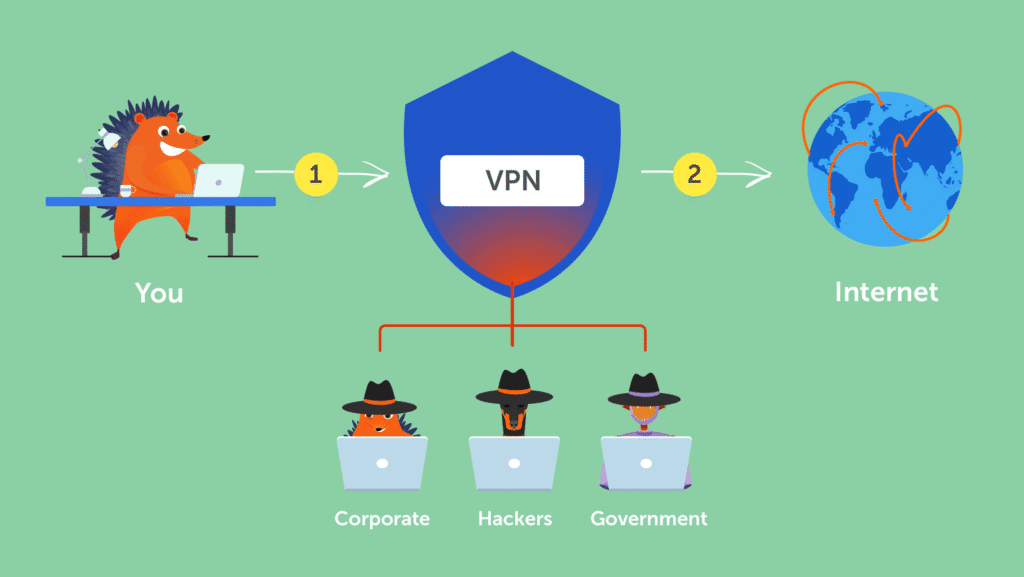In today’s world, remote work has become the new normal. From corporate managers in skyscrapers to digital nomads working from beachfront cafes, having a stable, secure connection to your company’s network is essential. But what happens when your job or business takes you to a place with strict internet regulations — like Dubai?
If you’ve recently relocated to the UAE or are planning a work trip, you’ve probably asked yourself, can I use my work VPN in Dubai? The answer isn’t a simple yes or no. It’s a matter of understanding the local regulations, using the right tools, and being smart about remote access.
In this guide, we’ll dive into the practicalities of using a work VPN in Dubai and share some essential tips to stay connected safely.

Understanding How VPNs Work for Remote Access
Before we get into the Dubai-specific details, let’s quickly cover what a work VPN does.
A Virtual Private Network (VPN) creates a secure, encrypted connection between your device and your company’s internal network. This is especially useful for accessing work emails, shared drives, internal applications, and sensitive files when you’re working away from the office.
It hides your online activity, shields your IP address, and bypasses geographic restrictions. Essentially, it helps you work as if you’re sitting at your office desk, no matter where you are in the world.
For many remote employees and businesses operating internationally, a VPN is more than just a convenience — it’s a necessity.
The Rules Around VPN Use in Dubai
Dubai, and the UAE in general, has one of the most monitored and regulated internet environments globally. Certain services like VoIP calls, gambling sites, and some media platforms are restricted under the country’s cyber laws.
However, that doesn’t mean VPNs are entirely illegal. The UAE allows the use of VPNs for legitimate purposes, such as connecting to your corporate network securely or protecting sensitive financial transactions. The issue only arises when VPNs are used to commit crimes or bypass government blocks on banned services.
In simple terms: using a VPN is legal in Dubai, as long as you’re not using it for anything prohibited under local laws.
So, if your VPN connection is purely for work-related activities like accessing your company’s network or handling client data securely, you’re in safe territory.

Work VPNs vs Personal VPNs: What’s the Difference?
This is where things often get confusing for expats and frequent travelers.
Work VPNs are typically set up and managed by your employer’s IT department. They connect you directly to your office network, enabling you to access internal systems, servers, and files securely. These are considered essential business tools and are generally recognized as legitimate by local authorities.
Personal VPNs, on the other hand, are commonly used for things like streaming content from other countries, accessing restricted websites, or enhancing online privacy. While personal VPN use is widespread, using it to bypass blocked services can be considered a violation in the UAE.
If you’re using a company-managed VPN with official business reasons, you have little to worry about. Just ensure you stay within legal boundaries.
Tips for Using a Work VPN in Dubai
While having a work VPN can make remote access in Dubai seamless, there are a few smart practices to keep in mind:
1. Choose a Reliable, Business-Grade VPN
If your company hasn’t provided one already, opt for a VPN that’s known for robust security protocols, reliable connections, and professional-grade encryption. Avoid free or unverified VPN apps, as these are often unstable and raise security concerns.
2. Keep Your VPN Updated
Regular updates aren’t just about new features — they’re critical for closing security gaps. Ensure your VPN client is always up to date with the latest patches and improvements to maintain a secure connection.
3. Avoid Using VPNs for Personal Streaming or Calls
Even if your work VPN allows you to access restricted sites, avoid using it for personal browsing, VoIP calls, or streaming services while in Dubai. This could unintentionally violate local regulations.
Stick to using your VPN exclusively for work-related activities to stay on the safe side.
4. Notify Your IT Department
If you’re traveling to Dubai for work or moving there temporarily, it’s a good idea to inform your IT team. They may have specific configurations, access permissions, or alternative solutions designed for employees operating in restricted regions.
They might also offer valuable advice or protocols to follow during your stay.
5. Secure Your Devices Beyond the VPN
A VPN secures your internet connection, but don’t forget to protect your devices too. Enable firewalls, install reliable antivirus software, and avoid using public Wi-Fi networks without precautions.
Maintaining overall digital hygiene is just as important as having a secure VPN tunnel.
Common Questions About VPN Use in Dubai
Is it safe to use a VPN in Dubai for work?
Yes — provided it’s a business-approved VPN used solely for legitimate work purposes. Avoid accessing restricted personal services while connected.
Can I get into legal trouble for using a VPN?
You could, but only if you’re using it to access banned content or services. Work-related VPNs managed by your employer for internal systems are generally acceptable.
Will my VPN connection be blocked in Dubai?
Some VPN services may face connectivity issues or restrictions. It’s always advisable to use enterprise-level VPNs with strong encryption and multiple server options to maintain stable connections.
Do remote companies allow employees to work from Dubai?
Absolutely! In fact, Dubai has emerged as a popular hub for remote workers and digital nomads. Many companies support their employees by providing secure VPN connections for seamless access to internal networks.
What to Do If Your Work VPN Doesn’t Connect
If you face trouble connecting your work VPN in Dubai, here are a few quick fixes:
- Switch to a Different VPN Protocol: Some protocols may be blocked while others work fine.
- Use Obfuscated Servers: These servers mask VPN traffic as regular HTTPS traffic, helping bypass VPN blocks.
- Reach Out to Your IT Department: They might provide a workaround or alternative solution.
- Consider a Cloud-Based Remote Desktop: If VPN isn’t working, remote desktop solutions hosted on cloud servers can be a practical alternative.
Dubai’s Growing Support for Remote Work
Interestingly, Dubai is increasingly promoting itself as a remote work-friendly destination. Initiatives like the Virtual Working Program allow professionals to live in Dubai while working remotely for overseas employers.
This has made it even more important for businesses and individuals to find reliable, secure ways to connect to their home networks. Business VPNs and remote work infrastructure are becoming more sophisticated and better supported within the country’s legal framework.
Final Thoughts
Dubai’s digital landscape might seem intimidating at first, especially if you’re accustomed to unrestricted internet access. But when it comes to using a work VPN, the rules are clearer than you might expect.
As long as your VPN usage remains strictly professional and you steer clear of accessing restricted services, you’ll have no issues staying connected and productive while in the UAE.
It’s always wise to stay informed about local regulations, keep your IT team in the loop, and choose reliable, business-grade tools for remote access. With the right precautions and awareness, working remotely from Dubai can be as seamless and secure as it is anywhere else in the world.
So go ahead — connect that VPN, log in to your company’s system, and tackle your tasks with confidence, even from the heart of the UAE.
Do follow UAE Stories on Instagram













